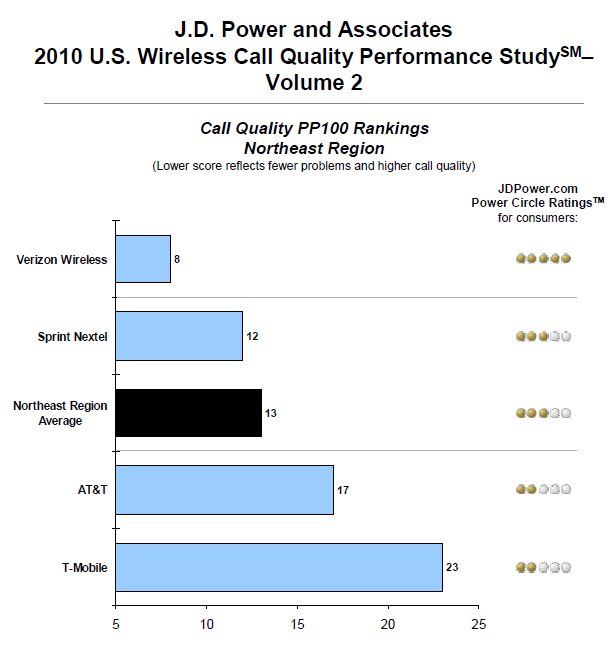Wireless call quality matters and that's bad news for AT&T, good for Verizon, Sprint

When it comes to dropped mobile calls, the wireless industry is a lot like real estate: It's all about location.
J.D. Power measured call quality in a report released Thursday and found that AT&T lags in most regions. Verizon and Sprint were near the top of the rankings in call quality and T-Mobile connectivity was totally hit or miss depending on where you live.
According to J.D. Power, wireless customers are using their phones less for calls, but still cite dropped calls as the primary reason for switching carriers. J.D. Power rated call quality based on dropped calls, interference, failed call connection on the first try, voice distortion, echoes; no immediate voicemail notification and no immediate text message notification.
The study rated carriers based on problems per 100 calls. Like golf, a lower score is better. The more interesting data was the call quality by region. These findings should factor into your choice of wireless carriers.
For instance, the Northeast findings illustrate how T-Mobile is a no-show far too often. Verizon Wireless dominates:
Ditto for the mid-Atlantic region:
In the Southeast, three carriers carry the day, but AT&T is still in the basement.
Only the North Central region---Illinois, Indiana, Michigan, Ohio and Wisconsin---gets solid performance from AT&T and T-Mobile over Sprint and Verizon.
In the Southwest---Texas, Oklahoma and the surrounding states---T-Mobile, Sprint and Verizon are all respectable.
And in the West, Verizon and Sprint lead in call quality. AT&T is again in the basement.
Add it up and AT&T may be in trouble if it loses its exclusive on Apple's iPhone. Simply put, the network performance just isn't there. Meanwhile, consumers know all about AT&T's network woes and that fact may be holding back Apple's iPhone sales. In a research note, Piper Jaffray analyst Gene Munster delivered the results of a survey of 258 cell phone users. Munster was out to see how the iPhone's much publicized antenna issue affected sales and the answer was not much. However, Munster noted:
We found that for every one respondent that acknowledged the antenna issue about three complained about the iPhone not being on Verizon. In other words, the lack of an iPhone on Verizon is holding sales back by about three times more than the antenna issue.
When you handicap AT&T's regional performance, Munster's findings aren't all that surprising.
